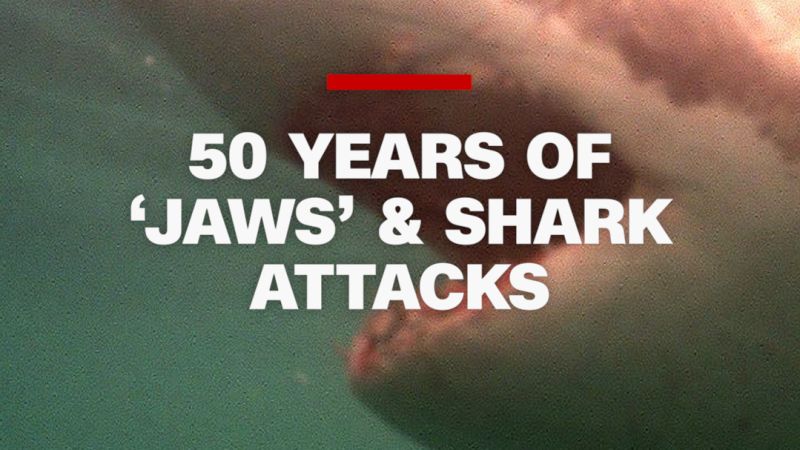Jaws At 50: Examining The Film's Impact On Shark Attacks

Welcome to your ultimate source for breaking news, trending updates, and in-depth stories from around the world. Whether it's politics, technology, entertainment, sports, or lifestyle, we bring you real-time updates that keep you informed and ahead of the curve.
Our team works tirelessly to ensure you never miss a moment. From the latest developments in global events to the most talked-about topics on social media, our news platform is designed to deliver accurate and timely information, all in one place.
Stay in the know and join thousands of readers who trust us for reliable, up-to-date content. Explore our expertly curated articles and dive deeper into the stories that matter to you. Visit Best Website now and be part of the conversation. Don't miss out on the headlines that shape our world!
Table of Contents
Jaws at 50: Examining the Film's Impact on Shark Attacks
Fifty years after its release, Steven Spielberg's Jaws remains a cinematic masterpiece, a thrilling tale of man versus nature that instilled a deep-seated fear of sharks in millions. But did this iconic film, responsible for a surge in shark-related anxieties, also influence the actual number of shark attacks? The answer, surprisingly, is complex and multifaceted.
While Jaws undeniably fueled a widespread "shark phobia," or galeophobia, the impact on shark attack statistics is debated among researchers. The immediate aftermath of the film's release in 1975 saw a significant increase in media coverage of shark attacks, often sensationalized and blown out of proportion. This led to a heightened public perception of risk, even if the actual number of incidents remained relatively stable.
The Jaws Effect: Fact vs. Fiction
The widely reported "Jaws effect" suggests a correlation between the film's popularity and a subsequent rise in reported shark attacks. However, this correlation doesn't necessarily equate to causation. Several factors muddy the waters:
-
Improved Reporting: The increased media attention following Jaws likely led to a more thorough reporting of shark attacks, previously overlooked or underreported. This means a rise in reported incidents doesn't automatically translate to a rise in actual attacks.
-
Increased Beach Attendance: Ironically, the summer blockbuster season, coinciding with Jaws' release, typically sees a higher number of people visiting beaches – thus increasing the statistical probability of encounters with sharks.
-
Fear-Driven Misidentification: The heightened fear of sharks might have led to instances where other marine creatures were mistakenly identified as sharks, further inflating the reported attack numbers.
The Long-Term Impact: Conservation Concerns
While the direct causal link between Jaws and a significant increase in shark attacks remains unclear, the film's legacy extends beyond box office numbers. The film’s lasting impact on public perception of sharks significantly impacted conservation efforts.
-
Negative Stereotyping: Jaws cemented the image of the great white shark as a relentless, man-eating monster, ignoring the crucial ecological role sharks play in maintaining healthy ocean ecosystems. This negative portrayal fueled fear-based culling and contributed to the decline of several shark populations.
-
Increased Awareness (Eventually): Paradoxically, the film's immense popularity also sparked a renewed interest in marine life and conservation. Over time, this led to increased efforts in understanding shark behavior and promoting responsible interactions with these magnificent creatures. Organizations like the Shark Trust and the Ocean Conservancy work tirelessly to educate the public and advocate for shark protection.
Understanding the Reality of Shark Attacks
It's crucial to understand that shark attacks remain statistically rare events. The chances of being attacked by a shark are incredibly low, far less than the risk of being struck by lightning or suffering a dog bite. However, maintaining respect for these powerful animals and understanding their behavior is essential for ensuring both human safety and shark conservation.
In conclusion, while Jaws undoubtedly shaped public perception of sharks, its impact on the actual number of attacks is complex and debatable. The film's enduring legacy, however, serves as a reminder of the importance of responsible environmental stewardship and dispelling myths surrounding these crucial ocean predators. Learn more about shark conservation and responsible beach safety practices by visiting reputable organizations dedicated to marine conservation.

Thank you for visiting our website, your trusted source for the latest updates and in-depth coverage on Jaws At 50: Examining The Film's Impact On Shark Attacks. We're committed to keeping you informed with timely and accurate information to meet your curiosity and needs.
If you have any questions, suggestions, or feedback, we'd love to hear from you. Your insights are valuable to us and help us improve to serve you better. Feel free to reach out through our contact page.
Don't forget to bookmark our website and check back regularly for the latest headlines and trending topics. See you next time, and thank you for being part of our growing community!
Featured Posts
-
 Lockheed Martin Lmt Stock Cantor Fitzgerald Boosts Investment
Jun 22, 2025
Lockheed Martin Lmt Stock Cantor Fitzgerald Boosts Investment
Jun 22, 2025 -
 Raf Base Infiltration Leads To Potential Ban For Palestine Action
Jun 22, 2025
Raf Base Infiltration Leads To Potential Ban For Palestine Action
Jun 22, 2025 -
 Immigration And Customs Enforcement Extends Deal Despite Centers Deficiencies
Jun 22, 2025
Immigration And Customs Enforcement Extends Deal Despite Centers Deficiencies
Jun 22, 2025 -
 Investment Firm Boosts Lockheed Martin Holdings What Does It Mean For Lmt Stock
Jun 22, 2025
Investment Firm Boosts Lockheed Martin Holdings What Does It Mean For Lmt Stock
Jun 22, 2025 -
 Major Staff Cuts At Voice Of America After Kari Lakes Executive Order
Jun 22, 2025
Major Staff Cuts At Voice Of America After Kari Lakes Executive Order
Jun 22, 2025
Latest Posts
-
 Mlbs Zack Cozart Trump Support Conditional On Avoiding War
Jun 22, 2025
Mlbs Zack Cozart Trump Support Conditional On Avoiding War
Jun 22, 2025 -
 Billionaire Pavel Durovs Inheritance The Distribution Among His Large Family
Jun 22, 2025
Billionaire Pavel Durovs Inheritance The Distribution Among His Large Family
Jun 22, 2025 -
 Assisted Dying Victory Claims Meet Ongoing Challenges
Jun 22, 2025
Assisted Dying Victory Claims Meet Ongoing Challenges
Jun 22, 2025 -
 Controversy Erupts As Ice Re Ups Deal With Detention Center Cited For Deficiencies
Jun 22, 2025
Controversy Erupts As Ice Re Ups Deal With Detention Center Cited For Deficiencies
Jun 22, 2025 -
 How Immigration Protests Affected Donald Trumps Public Approval
Jun 22, 2025
How Immigration Protests Affected Donald Trumps Public Approval
Jun 22, 2025
